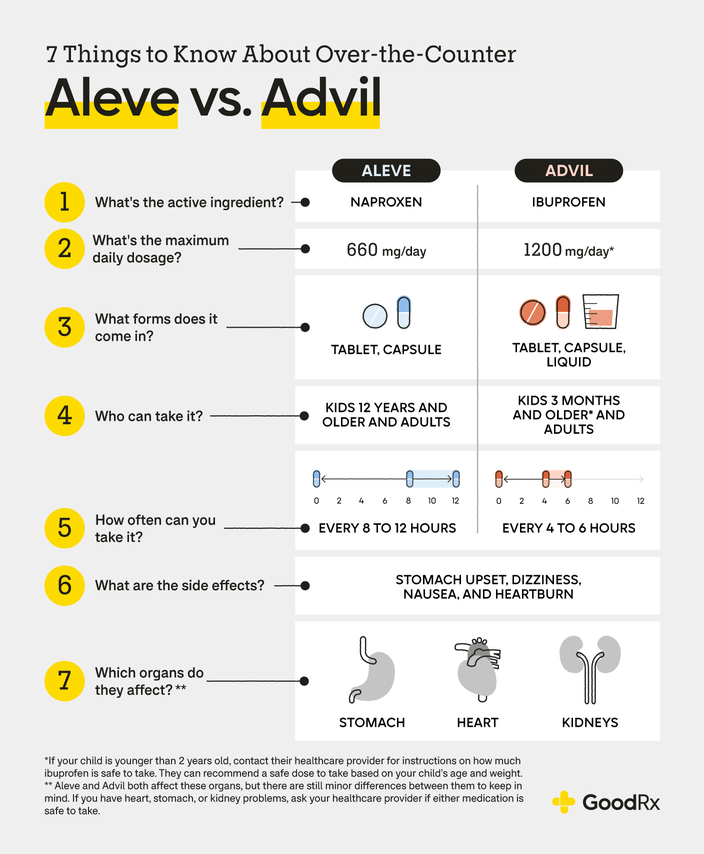We deliver to you every day from 7:00 to 23:00
The best discounts this week
Every week you can find the best discounts here.
Is Naproxen Better Than Ibuprofen for Pain?
When it comes to managing pain, nonsteroidal anti-inflammatory drugs (NSAIDs) like naproxen and ibuprofen are among the most commonly used over-the-counter medications. Whether you’re dealing with headaches, arthritis, muscle pain, or menstrual cramps, both naproxen and ibuprofen are often recommended for effective pain relief. However, you might be wondering, “Is naproxen better than ibuprofen for pain?”
This article will explore the differences between naproxen and ibuprofen, comparing their effectiveness, side effects, and suitable uses. By the end, you’ll have a better understanding of which medication might be best suited for your specific pain relief needs.
What is Naproxen?
Naproxen, sold under brand names like Aleve, is a nonsteroidal anti-inflammatory drug (NSAID) used to reduce inflammation, pain, and fever. It works by blocking enzymes in the body that produce prostaglandins, which are responsible for causing pain, swelling, and fever.
Uses of Naproxen
Naproxen is effective for managing various conditions, including:
-
Arthritis pain (rheumatoid arthritis, osteoarthritis)
-
Back pain
-
Menstrual cramps
-
Headaches and migraines
-
Toothaches
-
Muscle and joint pain
One of the advantages of naproxen is that it can last longer than ibuprofen, typically up to 12 hours per dose, making it more suitable for conditions that require extended pain relief.
What is Ibuprofen?
Ibuprofen, sold under brand names like Advil and Motrin, is another popular NSAID used to reduce pain, inflammation, and fever. Like naproxen, it works by inhibiting COX enzymes that produce prostaglandins. However, ibuprofen has a shorter duration of action than naproxen, typically lasting 4-6 hours.
Uses of Ibuprofen
Ibuprofen is commonly used for:
-
Headaches
-
Dental pain
-
Muscle aches
-
Fever
-
Minor injuries
-
Menstrual cramps
Since ibuprofen has a shorter duration of action, it is typically taken more frequently throughout the day, usually every 4-6 hours.

Comparing the Effectiveness of Naproxen and Ibuprofen
Both naproxen and ibuprofen are highly effective pain relievers, but their effectiveness can vary depending on the type of pain and how long you need pain relief.
Duration of Action
-
Naproxen: Because of its longer half-life, naproxen provides longer-lasting relief, making it ideal for chronic pain conditions like arthritis. Its effects can last up to 12 hours, meaning you don’t have to take it as frequently.
-
Ibuprofen: Ibuprofen, on the other hand, works more quickly but has a shorter duration of action—usually around 4-6 hours. This makes it better suited for acute pain or conditions where you need quick relief but can take medication more frequently throughout the day.
Strength and Potency
-
Naproxen: Naproxen is generally considered to be more potent than ibuprofen for inflammatory pain. If you’re dealing with inflammation, naproxen may provide better relief for conditions like arthritis and back pain.
-
Ibuprofen: While ibuprofen is also effective for reducing inflammation, it is generally not as strong as naproxen when it comes to treating chronic pain. However, for short-term, mild pain like headaches or muscle strains, ibuprofen is often sufficient.
Which One is Better for Your Pain?
Deciding whether naproxen or ibuprofen is better for you depends on a few factors, such as the severity of your pain, how long you need relief, and your health conditions.
When to Use Naproxen
Consider using naproxen if:
-
You need long-lasting relief for chronic pain, such as from arthritis or back pain.
-
You experience pain due to inflammation, such as muscle or joint swelling.
-
You can handle the potential side effects, which can include stomach irritation and kidney issues if used long-term.
When to Use Ibuprofen
Consider using ibuprofen if:
-
You need quick relief for acute pain such as headaches, toothaches, or minor injuries.
-
You only need pain relief for a short period (i.e., a few hours).
-
You are concerned about potential side effects, as ibuprofen is often easier on the stomach than naproxen for occasional use.
Side Effects of Naproxen and Ibuprofen
Both naproxen and ibuprofen come with potential side effects, and understanding these can help you make an informed decision about which one to use.
Naproxen Side Effects
Common side effects of naproxen include:
-
Stomach irritation or ulcers
-
Heartburn
-
Dizziness
-
Headaches
-
Increased blood pressure (especially with long-term use)
Long-term use of naproxen can also increase the risk of kidney damage and gastrointestinal bleeding, so it’s best to use it under the supervision of a healthcare provider, especially for chronic conditions.
Ibuprofen Side Effects
Common side effects of ibuprofen include:
-
Stomach irritation or upset stomach
-
Heartburn
-
Rashes
-
Dizziness or drowsiness
While ibuprofen tends to be easier on the stomach than naproxen, long-term or excessive use can still lead to kidney problems and gastrointestinal bleeding.
Naproxen vs Ibuprofen: Which is Better for Long-Term Use?
For short-term pain relief, ibuprofen is usually sufficient. However, when it comes to chronic pain or conditions like arthritis, naproxen tends to be the better choice due to its longer-lasting effects.
That said, prolonged use of either medication can cause side effects like gastrointestinal issues and kidney damage. Therefore, both medications should be used with caution for long-term pain management, and it’s always wise to consult your doctor before committing to long-term use.

When Should You Avoid Naproxen or Ibuprofen?
While both naproxen and ibuprofen are safe for most people when used correctly, there are certain situations where you should avoid them:
-
Stomach problems: If you have a history of stomach ulcers or gastrointestinal bleeding, you should avoid NSAIDs.
-
Kidney or liver issues: Both drugs can affect kidney function, so those with kidney disease should consult a doctor before use.
-
Pregnancy: During pregnancy, especially in the third trimester, NSAIDs like naproxen and ibuprofen should be avoided due to potential risks to the fetus.
-
Heart disease: Prolonged use of NSAIDs may increase the risk of heart attack or stroke, so they should be used cautiously in individuals with heart disease.
Alternative Pain Relief Options
If you find that naproxen or ibuprofen doesn’t work for you or causes unwanted side effects, there are alternatives available:
-
Acetaminophen (Tylenol) is another over-the-counter pain reliever, but it does not have anti-inflammatory properties like NSAIDs. It’s gentler on the stomach and liver but may not be as effective for inflammatory pain.
-
Topical treatments like lidocaine or capsaicin creams can provide localized pain relief without the systemic effects of oral medications.
-
Physical therapy or exercise can be beneficial for managing pain related to muscles and joints in the long term.
Conclusion
Both naproxen and ibuprofen are effective pain relievers, but their duration of action and strength vary. Naproxen may be better for long-term, chronic pain and conditions requiring inflammation reduction, while ibuprofen works faster for acute pain but needs to be taken more frequently.
Ultimately, the choice between naproxen and ibuprofen depends on the nature of your pain, how long you need relief, and your tolerance for potential side effects. If you’re unsure, it’s always a good idea to consult with a healthcare provider to determine the best option for your specific needs.
FAQ: Naproxen vs Ibuprofen for Pain
Q: Which is stronger, naproxen or ibuprofen?
A: Naproxen is generally considered stronger for inflammatory pain and provides longer-lasting relief, while ibuprofen works more quickly but doesn’t last as long.
Q: Can I take ibuprofen and naproxen together?
A: It is not recommended to take both naproxen and ibuprofen together, as they are both NSAIDs and can increase the risk of side effects like stomach bleeding.
Q: How long can I take naproxen or ibuprofen safely?
A: For short-term use (a few days), both medications are generally safe. For long-term use, it’s important to consult a doctor to avoid side effects, especially for those with pre-existing conditions.
Q: Can I take naproxen or ibuprofen for headaches?
A: Yes, both naproxen and ibuprofen are effective for headache relief, though ibuprofen tends to act faster.











